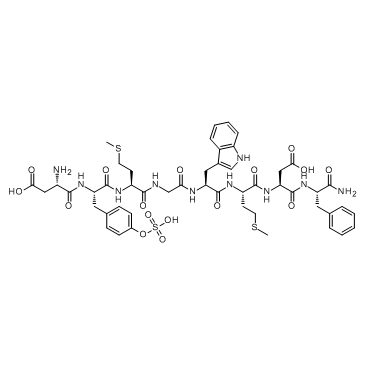Sincalide (CCK-8) (Synonyms: CCK-8S, Cholecystokinin (26-33), SQ 19,844, Sincalide) |
| Catalog No.GC32749 |
Sincalide(CCK-8) is a minor bioactive segment of CCK
Products are for research use only. Not for human use. We do not sell to patients.

Cas No.: 25126-32-3
Sample solution is provided at 25 µL, 10mM.
Sincalide(CCK-8) is a minor bioactive segment of CCK that retains most of the biological activities of CCK and is widely used to study CCK functions[1]. Sincalide is a rapid-acting, synthetic analog of cholecystokinin for intravenous use in postevacuation cholecystography, and has a variety of effects as a novel cardiovascular hormone[2,3].
Sincalide protects H9c2 cardiomyoblasts from Ang II-induced apoptosis partly via activation of the CCK1 receptor and the phosphatidyqinositol-3 kinase/protein kinase B (PI3K/Akt) signaling pathway[1]. Sincalide can protect human retinal pigment epithelial cells against apoptosis induced by peroxynitrite[4]. Sincalide dose-dependently inhibited METH-induced cytotoxic effect by activating the CCK2 receptor subtype in PC12 cells and CCK2 receptor stable transfected-HEK293 cells[5]
Sincalide can alleviate fibrosis in the noninfarcted regions and delay the left ventricular remodeling and the progress of heart failure in a MI rat model[2]. Sincalide decreased RPE cells apoptosis partly induced by ONOO- in Sprague-Dawley rats and is a potential drug for therapy of diabetic retinopathy[6]. Intramuscular injection of sincalide (0.07μg/kg) induced remarkable contractions of the gallbladder in vivo, and the contraction was nearly abolished by premedication of atropine sulfate (0.015 mg/kg)[7]
References:
[1]. Wang C, Yu H, et al. Protective effect of cholecystokinin octapeptide on angiotensin II-induced apoptosis in H9c2 cardiomyoblast cells. J Cell Biochem. 2020;121(7):3560-3569.
[2]. Wang C, Zhang C, et al. Cholecystokinin octapeptide reduces myocardial fibrosis and improves cardiac remodeling in post myocardial infarction rats. Int J Biochem Cell Biol. 2020;125:105793.
[3]. Maher KA. Kinevac (sincalide for injection)/Squibb Diagnostics. Gastroenterol Nurs. 1991;14(2):98-100.
[4]. Liu Y, Zhang Y, et al. Cholecystokinin octapeptide antagonizes apoptosis in human retinal pigment epithelial cells. Neural Regen Res. 2014;9(14):1402-1408.
[5]. Wen D, An M, et al. Cholecystokinin-8 inhibits methamphetamine-induced neurotoxicity via an anti-oxidative stress pathway. Neurotoxicology. 2016;57:31-38.
[6]. Hao LN, Wang M, et al. Control of peroxyntrite-induced production of inducible nitric oxide synthase isoforms and antagonism of cholecystokinin octapeptide -8 in retinal pigment epithelial cells in vivo. Int J Ophthalmol. 2011;4(6):605-610.
[7]. Takahashi T, Yamamura T, et al. Effects of cholecystokinin-octapeptide on the human gallbladder both in vivo and in vitro. Gastroenterol Jpn. 1986;21(1):49-54.
Average Rating: 5 (Based on Reviews and 13 reference(s) in Google Scholar.)
GLPBIO products are for RESEARCH USE ONLY. Please make sure your review or question is research based.
Required fields are marked with *




















